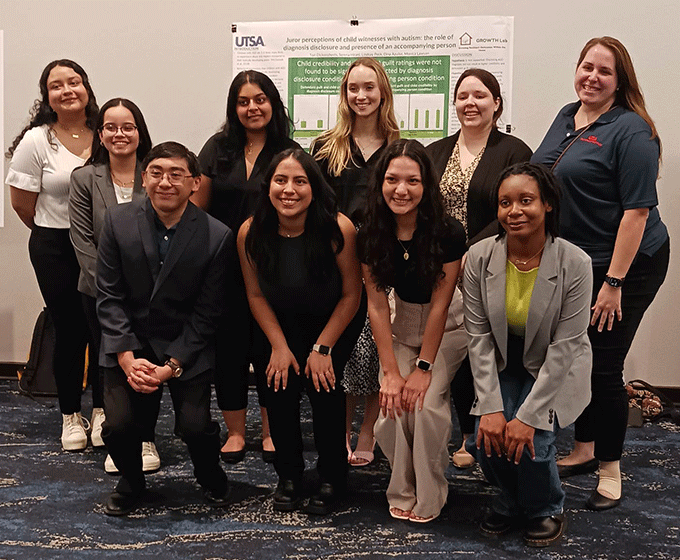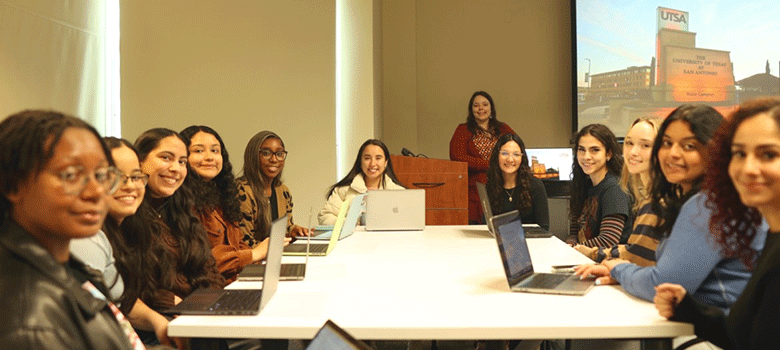
Tori Holland and Monica Lawson (back row; far right) conduct research through UTSA's GROWTH Lab.
JANUARY 3, 2025 — Psychology doctoral candidate Tori Holland will receive a 3-year, $180,000 graduate research fellowship from the National Institute of Justice (NIJ). The funding will support her project, “Jury Deliberations of Child Witnesses.”
Holland began her research in 2022 with a $1,500 competitive grant from the American Psychology-Law Society to run a pilot study. In addition, Holland was supported by the UTSA Initiative for Maximizing Student Development Program (IMSD), funded by the National Institutes of Health. IMSD provides a stipend and funds partial tuition and fees and travel expenses.
Her project, anticipated to launch this spring, entails gathering a group of participants to watch testimony of a child sexual abuse case with a child testifying during a cross and a direct examination. After watching the video, the participants will deliberate and decide if the alleged perpetrator is guilty or not guilty.
“I'm really interested in the conversations that are happening in the room,” she said. “What details from the testimony will jurors decide is important in their final decision? How many times will jurors change their views throughout the deliberation process?”

Holland’s work at UTSA is primarily conducted through the GROWTH Lab under the guidance of Monica Lawson, assistant professor of psychology. When the pilot study launched, Holland and her dedicated team of undergraduate students recruited volunteers and participants from UTSA to act as mock jurors. With this new funding, the study will expand to a community sample.
Students at the GROWTH lab, who are majoring in psychology, criminal justice, public health and more, are hard at work transcribing the videos from the pilot study. The deliberations are watched and each word is written down, line for line. They also account for nonverbal behaviors, like head nodding, arm-crossing and more. These transcripts are cross-referenced with excel sheets containing codes for each behavior.
“When I first started conducting research in the GROWTH lab, I coded data for nearly two years,” Holland recalls. “It’s a long process and you need to be reliable, but the information we can gather from these conversations will be well worth it.”
Lawson added, “Tori has been an instrumental leader in the GROWTH Lab for many years. Her outstanding scholarship has been recognized by many organizations. Securing the Graduate Fellowship from the National Institute of Justice further cements Tori as a rising scholar in the child witness field.”
As she expands her pilot study for this new project, Holland will recruit a more diverse pool of participants to gather data that is more realistic than that of the pilot study.
“I will be recruiting jury eligible members from the San Antonio community,” Holland explained. “This will provide a sample of individuals who more closely represent people actually selected as jurors compared to student populations.”
Holland is particularly excited to contribute to a field and topic where current literature is scarce. While there are studies on jury deliberations, there are very few, if any, about child witnesses.
While the main goal of this project is to educate citizens and justice officials on variants in juror deliberations, Holland can see how this study can serve as an offshoot for other projects.
“We can write so many different papers from just the data that we're getting — there are so many ways of looking at these conversations,” Holland said. “I’m also going to look at individual differences in jurors that may contribute to why jurors act differently and how it affects the deliberation process.”

Holland (back; by podium) poses for a photo with her peers in UTSA's GROWTH Lab.
Holland hopes that her research will help ensure the best outcome for those at the center of these cases.
“I want to be able to target any misinformation and figure out what education we can provide to make it so that children have a fair chance in these trials,” Holland said. “I really want to have data to determine if juror perceptions are aligning with the witnesses’ actual abilities and then take it from there.”
Jury deliberation sessions for this study are anticipated to start in the late spring.
UTSA Today is produced by University Communications and Marketing, the official news source of The University of Texas at San Antonio. Send your feedback to news@utsa.edu. Keep up-to-date on UTSA news by visiting UTSA Today. Connect with UTSA online at Facebook, Twitter, Youtube and Instagram.
Move In To COLFA is strongly recommended for new students in COLFA. It gives you the chance to learn about the Student Success Center, campus resources and meet new friends!
Academic Classroom: Lecture Hall (MH 2.01.10,) McKinney Humanities BldgWe invite you to join us for Birds Up! Downtown, an exciting welcome back event designed to connect students with the different departments at the Downtown Campus. Students will have the opportunity to learn about some of the departments on campus, gain access to different resources, and collect some giveaways!
Bill Miller PlazaCome and celebrate this year's homecoming at the Downtown Campus with food, games, giveaways, music, and more. We look forward to seeing your Roadrunner Spirit!
Bill Miller PlazaThe University of Texas at San Antonio is dedicated to the advancement of knowledge through research and discovery, teaching and learning, community engagement and public service. As an institution of access and excellence, UTSA embraces multicultural traditions and serves as a center for intellectual and creative resources as well as a catalyst for socioeconomic development and the commercialization of intellectual property - for Texas, the nation and the world.
To be a premier public research university, providing access to educational excellence and preparing citizen leaders for the global environment.
We encourage an environment of dialogue and discovery, where integrity, excellence, respect, collaboration and innovation are fostered.